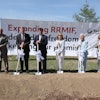SACRAMENTO, California (AP) -- A major revision proposed to California's tough auto emissions program would cut the number of battery-powered and hydrogen vehicles that automakers must produce for California and 10 other states.
Auto manufacturers say they need more time, but the proposal that the California Air Resources Board is scheduled to take up Thursday has drawn criticism from environmentalists, health advocates and some leading political figures. They question whether the state can afford to relax the rules on automakers in the era of global warming.
California adopted its zero-emission vehicle mandate in 1990. The rule required that by 2003, 10 percent of new cars sold in the state by the country's six major manufacturers be completely nonpolluting.
Ten other states -- Connecticut, Maine, Massachusetts, New York, New Jersey, Oregon, Pennsylvania, Rhode Island, Vermont and Washington -- adopted the California standard.
At the time, California's mandate was the most aggressive program in the nation requiring zero-emission vehicles, or ones that do not produce smog-forming emissions such as nitrogen oxide.
The rules have been modified four times since they were introduced. The biggest change came in 2003, when the Air Resources Board ruled that hydrogen cars, hybrids and cleaner-burning gasoline vehicles could meet the state's zero-emission mandate.
The regulators were concerned that battery-powered cars could not be mass-produced, and they were facing a lawsuit from the auto industry.
The program has not yet produced results. The main automakers still do not have a commercial zero-emission vehicle.
The 2003 rules set a goal of putting 25,000 such cars on the road by 2014. The recommendation before the Air Resources Board on Thursday would further reduce the number of hydrogen fuel cell or battery-powered vehicles automakers are required to put on the road in California between 2012 and 2014.
Instead of producing 25,000 vehicles, General Motors Corp., Toyota Motor Corp., Ford Motor Co., Honda Motor Co., Chrysler LLC and Nissan Motor Co. would have to build 2,500 for use in California. That number could be raised, however, when the board meets.
''I think that rollback is more extreme than what the board would go for,'' said Mary Nichols, chairwoman of the California Air Resources Board, who described the previous board's action in 2003 as a mistake.
To offset the lower mandate on zero-emission vehicles, the air board's staff proposes that automakers instead put 75,000 gas-electric hybrids on the road between 2012 and 2014. It also would require automakers to continue making more fuel-efficient gasoline vehicles.
That shift would satisfy the air quality goals of the program and save auto manufacturers $1.3 billion a year while they explore new technology, according to a report by the Air Resources Board staff.
General Motors spokesman Dave Barthmuss said automakers are spending hundreds of thousands of dollars to build one fuel-cell vehicle or battery-powered car. Such a vehicle would cost far more than the average American can afford, he said.
GM also has spent about $10 million on hydrogen fueling stations because not enough of them have been built to support the vehicles regulators are demanding.






















